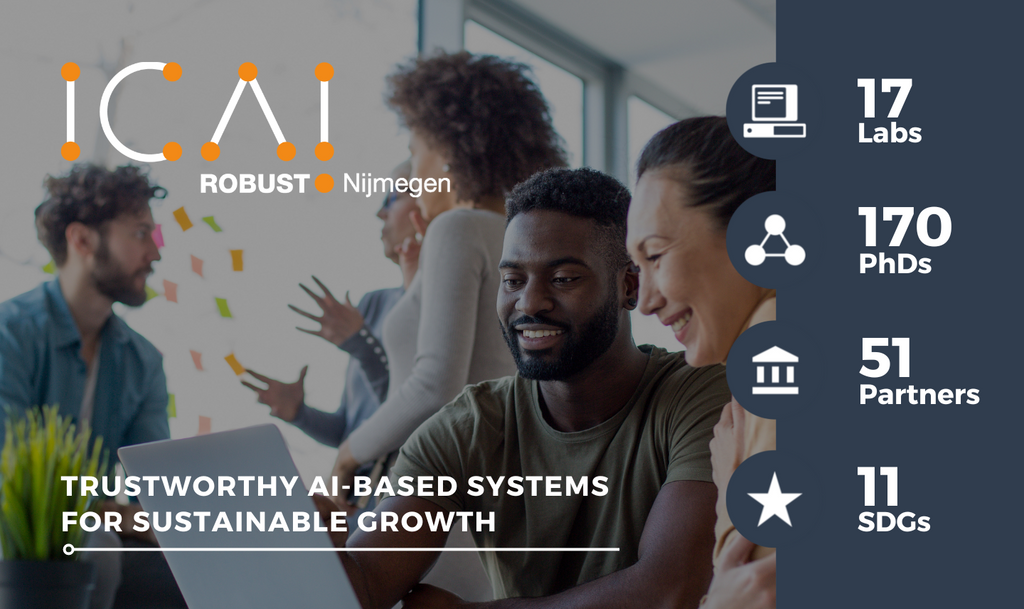
ROBUST AI programme
The ROBUST AI programme, a new initiative by the Innovation Center for Artificial Intelligence (ICAI), aims to strengthen the Dutch artificial intelligence (AI) ecosystem by boosting fundamental AI research. The programme is supported by the University of Amsterdam and 51 government, industry and knowledge-sector partners. ROBUST focuses primarily on the development of trustworthy AI technology for the resolution of socially relevant issues, such as those in healthcare, logistics, media, food and energy.
Seventeen new public-private ICAI labs will be set up under the ROBUST umbrella and form part of the Innovation Center for Artificial Intelligence (ICAI), thus bringing its lab total to 46. ICAI focuses on AI talent and knowledge development in the Netherlands.
Radboudumc is one of the 17 knowledge institutes participating in ROBUST and will host four new healthcare ICAI labs: MERAI Lab, HEALTHY-AI Lab, AI for Parkinson lab, and CARA lab.
MERAI Lab
Healthcare costs are globally rising. The workload of radiology departments has substantially increased and is still increasing, and, as a result, radiologists are under large pressure and risk of burn-out. The imminent implementation of lung cancer screening and the rapid increase in the availability of novel cancer treatments such as immunotherapy will result in a continued increase of imaging. MERAI Lab is a collaboration between Radboudumc and MeVis Medical Solutions with the mission to create world-leading AI-supported software solutions for healthcare. We aim to create AI solutions in the lung oncology field that will improve the accuracy in the interpretation of the increasing amount of imaging that is performed for screening, optimal treatment selection and treatment monitoring, and reduce the time needed to report these scans. Both combined will improve the cost-effectiveness of our healthcare system. For responsible use of the developed AI algorithms, it is essential that we guarantee robust and trustworthy AI solutions that reach performance close to human experts.
Healthy AI Lab
HEALTHY-AI is a collaboration between Radboudumc, University Medical Center Groningen, University of Twente and Siemens Healthineers. HEALTHY-AI develops reliable and robust artificial intelligence (AI) technology with a specific focus on MRI-guided prostate cancer diagnosis and treatment. A team of five PhDs will be working on projects related to annotation efficiency, pathway risk predictors, AI quality control, follow-up comparison, and MRI automation. In the next five years, HEALTHY-AI aims to improve AI by optimizing data annotation processes, improving the ability to predict treatment outcomes, and continuously learning under quality control. This will result in improved cancer detection and follow-up, and the automation of MRI will enhance image quality and dynamic protocols for prostate cancer.
AI for Parkinson Lab
The paradigm of how we quantify Parkinson’s disease is shifting from short, in-clinic evaluations to objective, frequent measures obtained at home. At the AI for Parkinson lab, Radboudumc and Verily Life Sciences are jointly developing novel digital biomarkers based on automated analysis of wearable sensor en video recordings. Over the past years, we have conducted multiple unique cohort studies, monitoring large groups of people with Parkinson’s disease during daily life using a multi-sensor smartwatch, in addition to elaborate assessments, including in-clinic and at-home video recordings, clinical scales, fMRI, ECG and biosamples. Our multidisciplinary lab develops AI-based tools to derive reliable and sensitive digital biomarkers, transforming clinical trials and care for people living with Parkinson’s.
CARA Lab
Cardiovascular disease remains the world’s leading cause of mortality and morbidity. Atherosclerotic disease of the coronary arteries can lead to myocardial infarction, a life-threatening condition with an estimated annual incidence of >70,000 patients in the Netherlands only. Whether or not to decide for a percutaneous coronary intervention (PCI) procedure remains one of the biggest clinical challenges in current daily practice. To help in this decision process, promising intravascular imaging techniques have recently been developed that offer the opportunity to assess plaques ‘at risk’ for future events. Among these is optical coherence tomography (OCT), a near-infrared light based imaging technique with a high spatial resolution. OCT enables precise characterization of the vessel wall and atherosclerotic disease. In the CARA lab we aim to develop and test AI-based algorithms to provide real-time analysis of OCT images, in order to improve the use and interpretation of these images, ultimately leading to improved clinical decision making. CARA is a unique collaboration between the Radboudumc, Amsterdam UMC and Abbott, an international leading medical devices and health care company.
Job description
We are looking for enthusiastic PhD candidates to develop deep-learning algorithms for the different aims of the new AI labs. The developed algorithms will support clinicians in diagnosis and treatment process. As described, the applications in the new AI labs cover primarily radiology, neurology, or cardiology.
Profile
You should:
- be a creative and enthusiastic researcher with an MSc degree in Computer Science, Physics, Engineering or Biomedical Sciences or similar
- have a clear interest to develop artificial intelligence algorithms and an affinity with medical topics.
- have good communication skills and enjoy working in a multidisciplinary team
- have expertise in software development, preferably in Python
- having experience with deep learning, machine learning, and image analysis or time series analysis is a plus.
Terms of employment
You will be appointed for four years as a PhD student with the standard salary and secondary conditions for PhD students in the Netherlands. The research should result in a PhD thesis.
Organization
You will work in one of the four new AI labs, closely linked to the Diagnostic Image Analysis Group (DIAG). DIAG develops computer algorithms to interpret and process medical images. The group currently consists of around 70 researchers. Radboud University Medical Center and Radboud University are located in Nijmegen, the oldest Dutch city with a rich history and one of the liveliest city centers in the Netherlands. Radboud University has over 17,000 students. Radboud UMC is a leading academic center for medical science, education and health care with over 8,500 staff and 3,000 students.
Information
For more information please contact one of the lab managers by e-mail:
- MERAI Lab: Colin Jacobs
- Healthy AI Lab: Henkjan Huisman
- AI for Parkinson Lab: Luc Evers
- CARA Lab: Jos Thannhauser
Application
Application links for the PhD positions in MERAI Lab, Healthy AI Lab, AI for Parkinson Lab, and CARA Lab will follow soon.
For the moment, applications can be emailed to the respective lab managers. You should supply a motivation letter, your CV, links to a Google Scholar profile, a list of grades and courses you have followed including online courses on deep learning and similar topics, and links to any publications you have written plus any code you have written and is publicly accessible, e.g., on a GitHub account. Applications are processed immediately upon receipt.




